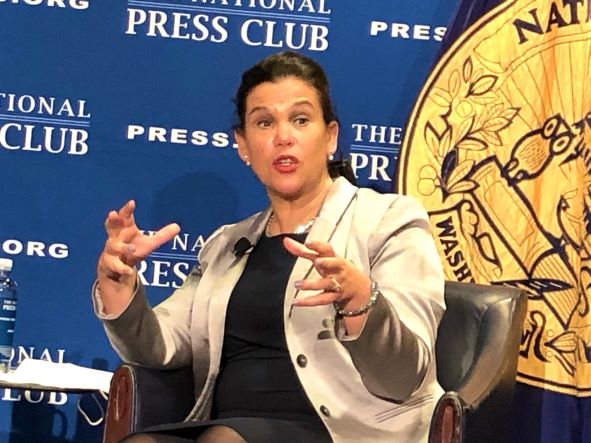Sinn Féin leader: A unified Ireland possible within decade
One hundred years after Northern Ireland stayed with the United Kingdom when Ireland won independence, the goal of one united Ireland could be achieved within five to 10 years, Sinn Féin party leader Mary Lou McDonald said at the National Press Club on Thursday.
Expectations have changed, and Brexit has elevated the idea of reunification, she told interviewer Alison Fitzgerald Kodjak, a past president of the Club.

The idea is not "just a Sinn Féin issue" since, for example, new trade rules under Brexit, the United Kingdom's withdrawal from the European Union, raised the prospect of a hardened border between the Republic of Ireland and Northern Ireland, McDonald said.
"You can move seamlessly throughout the island, and people transact their business and live their lives ... with no sense that you are moving from one legal jurisdiction to another," she said of the current situation. "The reality is we live on a small island -- an incredibly beautiful island -- and it makes no sense at all ... to have two of everything. The opportunity for economic scale, for innovation, is so much greater when we work together. The smart way to do business, the smart way to be entrepreneurial, is to operate on an all-island basis."
Sinn Féin is the Republic of Ireland's largest opposition party, and its voter strength is growing. In Northern Ireland, it is one of five parties in a coalition government.
McDonald, who met with U.S. congressional leaders this week, said she has "deep appreciation for the very solid support that the United States has extended to Ireland" since the Good Friday agreement of 1998, which led to Northern Ireland's power-sharing system of government and an end to most political violence.
That political violence -- three decades known as "The Troubles" -- remains an issue. British Prime Minister Boris Johnson's Conservative Party government is proposing amnesty to end investigations of killings by police, military and paramilitary groups in that era of conflict between people with British and Irish loyalties. Political parties in Northern Ireland are opposed to the policy.
